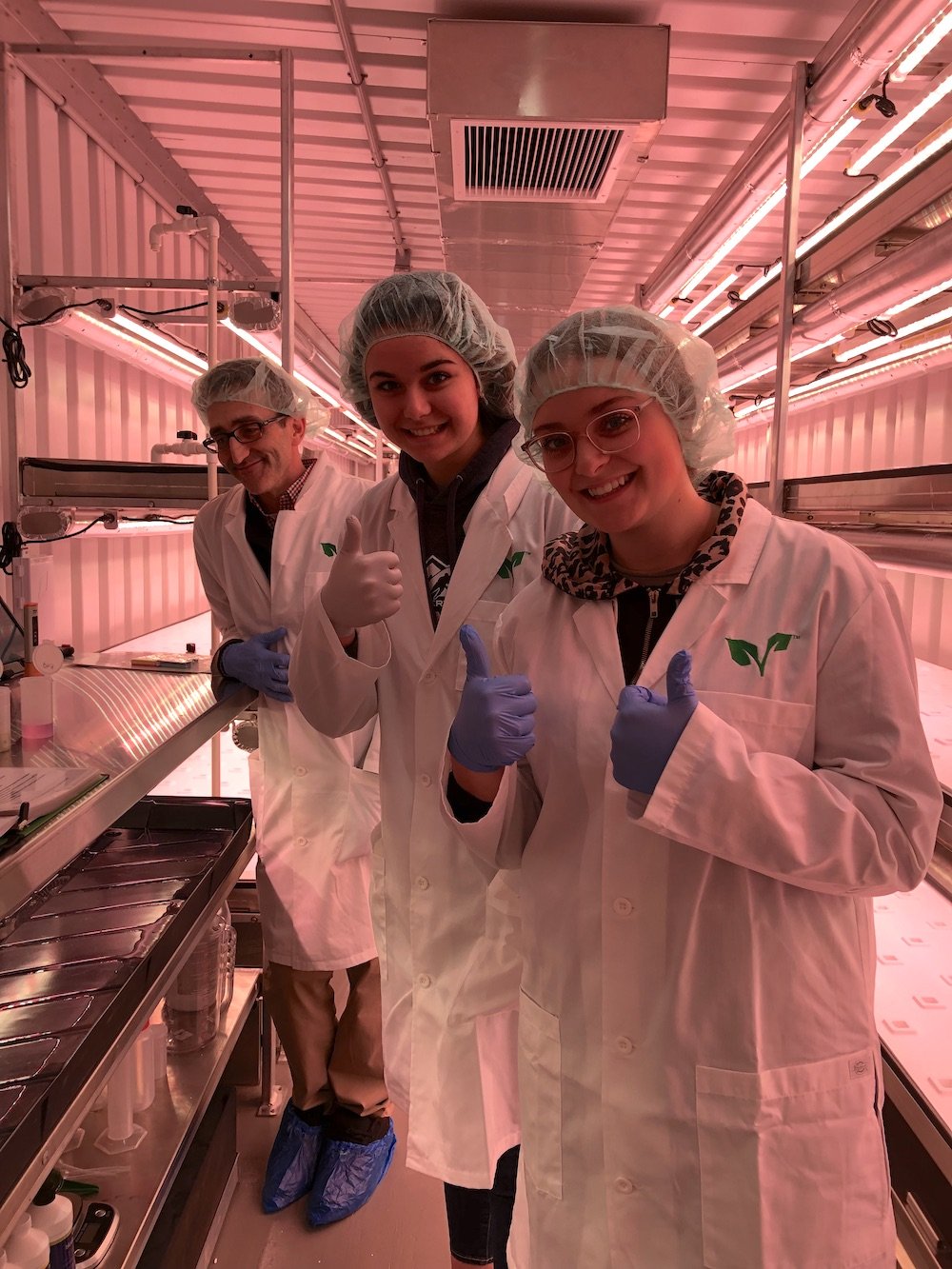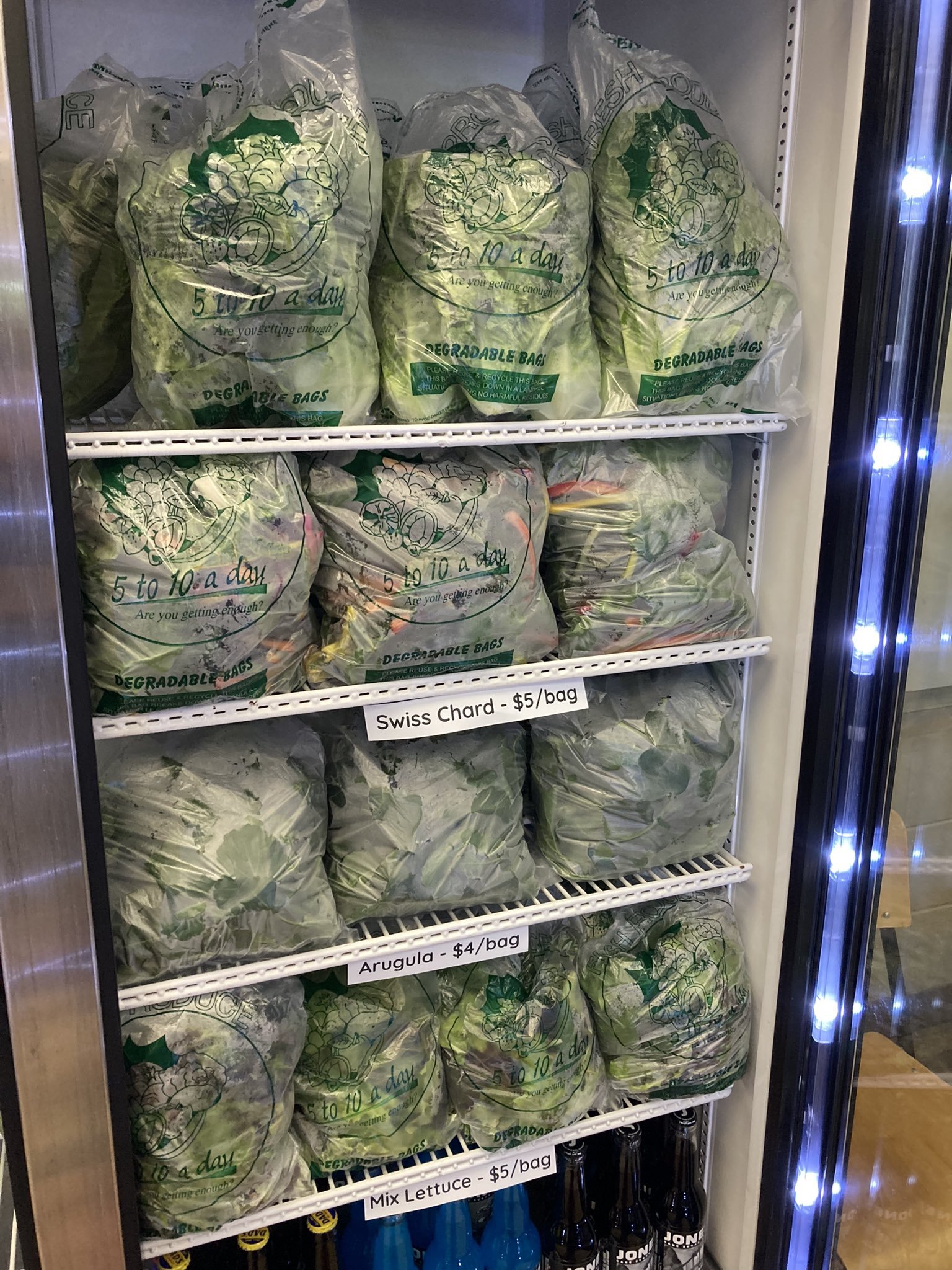Adding agriculture to the classroom: Altario School
Project at a Glance
Installed in April 2022 in Altario, Alberta.
Project goal: Provide extra hands-on learning opportunities for Altario’s agriculture program.
Distribution model: Produce is sold to the community through a biweekly subscription and at the school store. Extra produce is sold to a senior’s lodge nearby.
Impact: There’s never a shortage of students who want to volunteer in the farm and the local community loves the fresh vegetables. The Altario School will expand with their second farm in the fall of 2023 because of the great response.
Operator: A teacher leads the operation and has two student volunteers join to help with tasks. The two student volunteers rotate among a group of students who are interested in helping in the farm.
“So I was like wow, this can be something very special for the community, food wise, and for the students, career pathway wise.”
Redefining the classroom with agriculture
The Altario School created an agriculture education program where students can get hands-on experience raising chickens, sheep, cows, turkeys, and bees.

On the border of Alberta and Saskatchewan, sits the Altario School. A small rural school just shy of 70 students.
The idea for the agriculture academy came from a conversation school Principal Kevin Van Lagen had with a group of graduating students.
A majority of the students were going to university to pursue careers in agriculture. It led to him thinking, why should they have to spend thousands of dollars to see if they would like agriculture in university when they can gain some experience before?
As a result, the Altario School created an agriculture education program where students can get hands-on experience raising chickens, sheep, cows, turkeys, and bees.
Expanding with a vertical farm
In 2022, the Altario School added a hydroponic vertical farm to be able to grow fresh produce and teach students about controlled environment agriculture. The idea to add a Growcer farm came from a grandparent of a couple current students, and was a perfect fit to extend their existing agriculture program.
The school also investigated expanding the agriculture program with a commercial space to sell meat products or a commercial kitchen to make products like sausage.
“We had a group of students that wanted to be involved in the farm but there was nothing [specific] they were passionate about. They weren’t interested in working with the animals . . . But this [Growcer farm] was so much more and different. There was the organization part of it, the harvesting, the customer part,” Kevin Van Lagen says. “There’s so many avenues there that our whole program grew significantly by adding the Growcer farm.”
In Altario, the closest grocery store is 50km away and the produce available is expensive and inferior.
“So I was like wow, this can be something very special for the community, food wise, and for the students, career pathway wise,” Kevin Van Lagen says.
The school applied for a grant from the Local Food Infrastructure Fund and were successful. The rest of the funds came from a donation from the local agriculture society and a portion from the school division.

In 2022, the Altario School added a hydroponic vertical farm to be able to grow fresh produce and teach students about controlled environment agriculture.
Growcer farm as a classroom
In the Altario School, their student-led farm fits into the curriculum under the “CTF” course.
In Alberta, Career and Technology Foundations (CTF) provides students in grades 5 to 9 the opportunity to explore their interests within various occupational areas and technologies.
Ultimately, the goal for the agriculture program is to create career pathways for students and have them understand the many opportunities available within the agriculture industry.
“I think the Growcer [farm] brings another level to our program because of the technology and because of the SOPs (standard operating procedures) and how you’ve got to be on track. It’s a little different than bringing scraps to pigs,” Kevin Van Lagen says.
“It’s totally different than sitting in a classroom studying. It’s hands on and it’s a nice environment.”


Ellen Van Lagen teaches at the school and leads the operation of the Growcer farm. Students from grades 7 to 12 volunteer to help in the farm with various tasks from seeding to transplanting to harvesting.
“It’s totally different than sitting in a classroom studying. It’s hands on and it’s a nice environment. They don’t complain about coming at all,” Ellen Van Lagen shares.
“The older kids love being in there. They like the environment. It’s calming, they say. And they also like to get out of class,” Ellen Van Lagen quips.
The modular farm - and the diligence required by indoor agriculture - opens up doors for students who are interested in research-based opportunities in agriculture. One of the students who volunteered in the Growcer farm was accepted to study agronomy at the University of Saskatchewan.
“When [the student] toured [the university] and she explained what she did in high school, they were mind blown that she was doing this in high school,” Kevin Van Lagen says.
Results - Fresh greens making a local impact


The greens grown in the Growcer farm are sold at the school store and sold directly to around 50 community members through a biweekly subscription. Extra produce is sold to Hillcrest Lodge Seniors Home in nearby Provost, Alta. and used in some of the weekly hot lunches the school provides.
“Having fresh greens has been awesome for the community,” Ellen Van Lagen says, adding that enthusiasm grew as the project continued to grow.
“It’s just a box from the outside right? It took a little bit to be open to buying greens from there. We found when we brought community members into the actual farm to see what it was like, they were pretty impressed and they bought on pretty quickly,” Ellen Van Lagen explains.
“This one lady said to me that they’re eating supper on a Wednesday evening and she had bought the lettuce that afternoon that had been harvested that morning. And she said, ‘I explained to my kids just how amazing it is for us to eat this quality of produce that’s just harvested on our plates in Altario, Alberta,’” Kevin Van Lagen adds.
It’s not only the local community that loves it - the people who helped make the project happen are also impressed with how much it’s grown.
The superintendents from the school division “absolutely love it.”
“The Growcer farm is so unassuming from the outside right? They walk in and it’s like whoa, the look in their faces is just wow. And our students are doing this? And it’s instant, this is amazing,” Kevin Van Lagen says.
The local Agriculture Society and its members also threw their support and dollars behind the project early on and they’re seeing the payback.
“The Ag Society and its community members, it’s all been positive feedback. And well the fact that they gave $60,000, they believe in the program and they’re happy to see how it’s working,” Kevin Van Lagen says.
At the end of the school year, the school hosts a thank-you barbeque. The tables serve lamb and pork the students have raised, and salad the students grew within the farm.
“Everything that was served that the students had a part in raising or growing and they’re so proud of the fact that all that food was their work,” Kevin Van Lagen shares.
The future of the project

Kevin Van Lagen (second from the left) stands with members of the community during Altario’s open house event.
An education farm is a farm with less growing racks and more room to teach.
The feedback from the community has been outstanding, so much so that the project is currently in the midst of expanding. The Altario School invested in a second vertical farm through Growcer to grow even more fresh produce and offer training opportunities.
Their new farm is special because it will be one of the first Growcer Osiris Education Farms in Canada. An education farm is a farm with less growing racks and more room to teach.
Kevin Van Lagen also participated in the creation of the Kitigan Gamik Initiative: a land-based curriculum to provide culturally relevant, hands-on education and training in areas of food sovereignty and sustainability to Indigenous youth.
For other educators who want to take on a project within their school, Kevin Van Lagen offers some advice: Find your champion. You don’t need a huge group, just a few passionate people with the drive to get a project like this going.
Step inside the Osiris Education Farm with this spec sheet
Altario School’s new farm is extra special because it will be one of the first Growcer Osiris Education Farms in Canada. An education farm is a farm with less growing racks and more room to teach, but that’s not all.
Fill out the form below to download the Osiris Education spec sheet to see what makes this modular farm perfect as an extended classroom.


